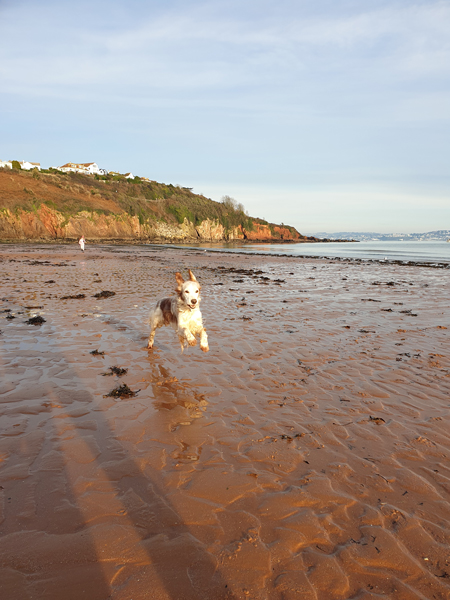
In 2017 we invested in equipment at our Torquay surgery to be able to offer keyhole surgery for the benefit of our patients, one of the first practices in Devon to do so. Keyhole surgery is now considered the highest standard in human medicine due to faster recovery times and less pain, and we see the same in our pet patients. Clients who use our Paignton surgery can still make use of these services, your pet will just need to be brought to the Torquay surgery.
Keyhole surgery can be utilised for one of our routine procedures – neutering of female dogs. ‘Keyhole spay’ is becoming more common throughout the UK, but we were one of the first practices in Devon to offer this to our patients. A normal spay involves removal of the womb and ovaries via an incision through the skin and muscle of the middle of the tummy. For a large dog this can be quite a big wound of 10cm or more. With key-hole surgery the ovaries are removed via 2 tiny incisions, less than 1cm long. The main advantages to the patient are:
- It is less painful than a traditional spay. Although we always use pain relief for all our patients, there is less pain associated with two tiny incisions than one large one and this can only be a good thing!
- It provides the surgeon with a much better view. Even though the holes are very small, the camera equipment used allows the surgeon to see more clearly within the abdomen and get up close to things to see them in great detail. This reduces potential complications.
- Less bleeding, swelling and bruising. The keyhole spay makes full use of our ‘harmonic scalpel’ which seals blood vessels and tissue before they have a chance to bleed. This creates much less trauma than a traditional spay, with little or no bleeding.
- Faster recovery. As the incisions are so much smaller, your pet is more likely to be able to get back to normal activity much sooner than with a traditional approach.
- The ‘cone of shame’ – often with a keyhole spay this is not required, much to your dog’s delight!
A recent study has shown that a keyhole spay procedure has significant benefits and a lower post-operative complication rate, compared with traditional spay surgery in dogs.* You can also find further information about the benefits of keyhole spay here.
Keyhole surgery can also be used for neutering of female cats and cryptorchid dog and cat castrations i.e. when one or both of the testicles are retained within the tummy.
For more information about neutering, including prices, click here.
The other area where keyhole surgery is of huge benefit is in ill dogs or cats who have disease within their tummy. Keyhole surgery allows the surgeon to get an excellent view of the tummy organs and to take biopsies, e.g. of the liver, without your pet undergoing major surgery.
Keyhole surgery at Greenbay Vets is led by Dr John Mather, an RCVS Advanced Practitioner in Small Animal Surgery. John has also undergone additional, specific training in this area and we invested in the best equipment available for the job, rather than cheaper alternatives. For example, we use a harmonic scalpel rather than simple cautery, so we cause the least amount of tissue damage; and we have hospital grade gas sterilisation facilities for our keyhole equipment – other practices use a simple soaking process that is significantly less effective.
* Charlesworth TM and Sanchez FT (2019). A comparison of the rates of postoperative complications between dogs undergoing laparoscopic and open ovariectomy, JSAP 60(4):218-222.
